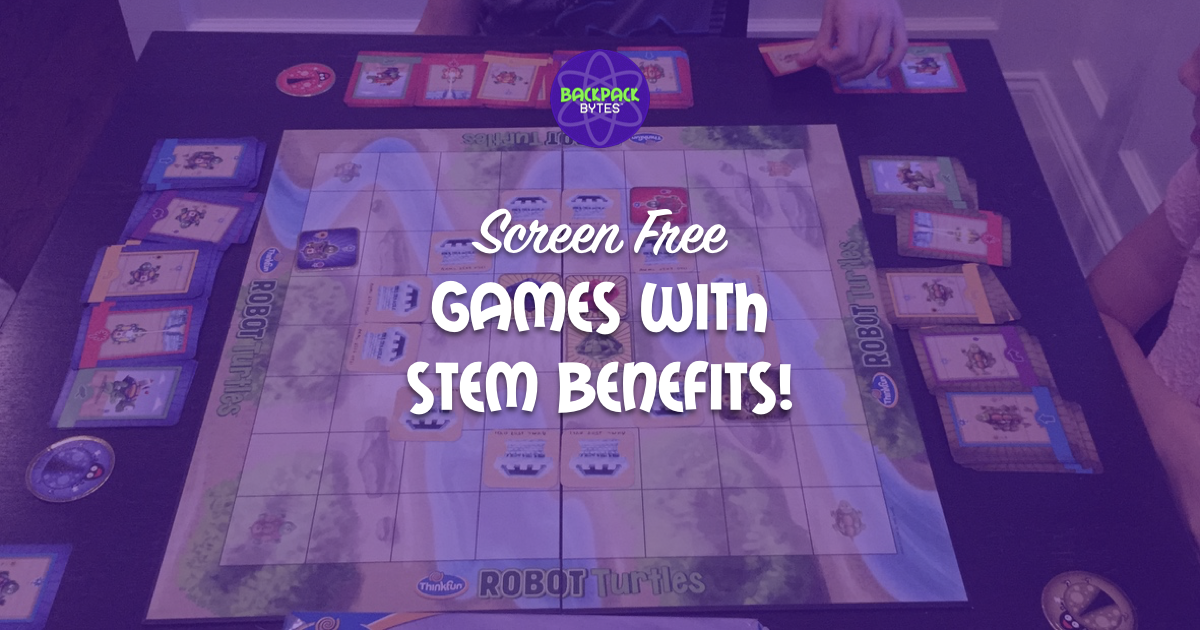A Break From Devices: 10 Screen Free Games with STEM Benefits!
It is so rewarding to be able to take time and connect over games. In addition to being great ways to foster communication, playing games forsters strategy, critical thinking, and problem solving skills.
It’s helpful to keep in mind that STEM doesn’t always equate to being online, playing digital games or building robots! Many screen free games have hidden science, technology, engineering and math benefits that help to sharpen kids’ skills.
Below are a few of our favorite screen free games with STEM benefits that we like to play with our families.
10 Screen Free Games with STEM Benefits:
1. Yahtzee
Yahtzee is a great game with accessible math for young kids, older kids, and adults. The dice provide a great opportunity to work on matching, counting, and probability. The more you play, the more comfortable kids get with counting the dice and analyzing their card. It is fun for kids ages 5 & up.
2. Monopoly
Classic Monopoly: This classic game teaches financial basics so kids can flex their math muscle. It is also a rare opportunity where kids can see cash in action in our digital banking world.
3. Weird But True The Game
Weird But True The Game: Weird But True books from National Geographic Kids are some of our favorites that feature many facts about animals, nature, and science. This game is a fun mash-up from Brain Games Kids the Board Game and National Geographic Kids and is packed with questions that kids ages 8 & up will enjoy. In addition to learning fun facts, everyone plays on every question during this game.
4. Allowance Game
Allowance Game: This is a fun game where kids can practice math skills and how to manage money. Counting, making change, and getting comfortable with dollar values. It also helps to open up practical conversations about how much things cost and the how the value of money. Fun for kids ages 5-11.
5. Robot Turtles
Robot Turtles: This is a quick and fun board game that teaches the fundamentals of programming. The older student, or adult, as the “turtle mover” provides informative feedback by moving the players’ turtles according to the actions each player chose. The game can start at a simpler level so the concepts are easier to grasp and you can add in elements to make the gameplay more challenging in future games. Recommended for kids ages 4 & up.
6. Quirkle
Qwirkle is a sequence creation game. Players play a sequence of tiles that match in either shape or color to score points. This game is very quick to learn and fun to play. It is recommended for kids ages 5 & up.
7. Ticket to Ride
Ticket to Ride is one of our favorite strategy games. Players build train tracks across the United States, and attempt to complete their unique trek tasks for bonus points. The strategy is in choosing which routes to take as you count your path, multi-step problem solving, determining which bonus cards to target as you ride across the US, and reacting to how your opponents’ paths as well. While this game is fun for family members of all ages, it is recommended for kids ages 8 & up.
8. Code Master
Code Master – The Ultimate Coding boardgame. Learn the basics of coding and programming, without even turning on a screen. Using one of the 10 different puzzle maps, use logic and problem solving to move your character around and collect power crystals. Use action (jump, slide, run) and conditional tokens to code different sequences and complete the 60 different challenges for kids ages 8 & up.
9. Jenga
Jenga This classic game is ideal for teaching problem solving, critical thinking, fine motor skills, and inspiring future engineers. Building the tower as high as you can and then watching it fall also inspires kids to keep trying and to keep looking at new ways to problem solve. It is recommended for kids ages 6 & up.
10. Mouse Trap
Mouse Trap is a classic board game that draws on math and engineering skills for the younger set. This game is also great for developing understanding of cause and effect as well as decision making. Great for kids ages 6+!
We hope you enjoy playing these games with STEM benefits. Do you have any favorites that we should add to our must play list?






0 Comments